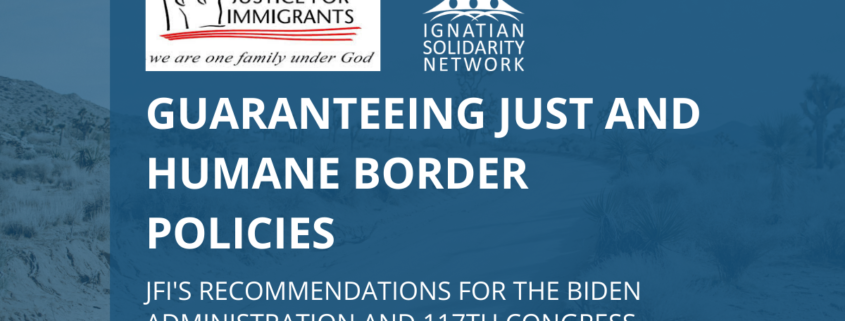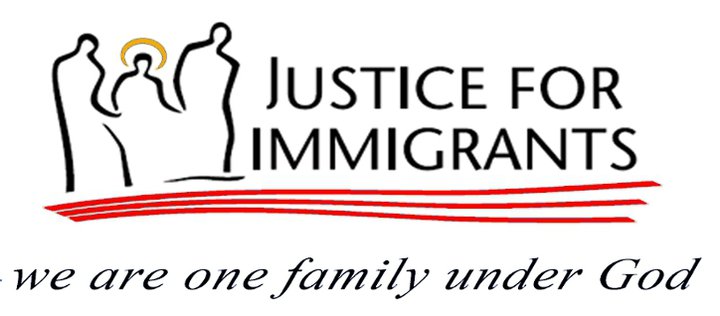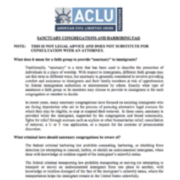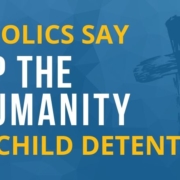Justice for Immigrants: Guaranteeing Just and Humane Border Policies
The following statement was issued by Justice for Immigrants (JFI) in December of 2020, as part of the JFI coalition’s collective recommendations for the incoming Biden Administration and the 117th Congress.
As Catholics, we believe that every person has the right to a safe and dignified life. As people seek to access protection in the United States, the U.S.-Mexico border has seen dramatic increases in militarization. While the Catholic Church recognizes the right of nations to maintain their borders, it equally affirms the right to migrate. There are immediate concerns related to the militarized approach taken on the U.S.-Mexico border that must be addressed. Additionally, recent changes to policy and practice have decimated the U.S. asylum system. Asylum is a crucial tool to ensure people who are fleeing violence and insecurity can find safety here in the U.S. and it must be rebuilt. The U.S. should restore and uphold access to asylum in a manner that offers a genuine humanitarian response and respects U.S. and international law. The U.S. government should solicit feedback from local border community stakeholders regarding increased use of force at the U.S.-Mexico border. We urge the Biden Administration to take the following actions:
1. Utilize just and humane border management:
- Demilitarize the border:
- Reform border management to be more unified with broader U.S. economic and humanitarian interests and the wellbeing of local communities, while employing strategies that ensure all are treated with dignity.
- Reverse the increased use of military tactics and refrain from deploying individuals primarily trained for national defense, which merely increase the amount of violence and civil rights violations committed on the border.
- Halt border wall construction, including efforts to seize private property and waive crucial environmental protections. Additionally, respect the religious freedoms of indigenous residents and transborder tribes and restore access to sacred sites and the ability to make spiritual pilgrimages across borderlands. •
- Ensure public health and safety:
- Allocate additional federal pandemic relief aid for the border region to address the lack of public health resources.
- Apply available data from public health experts to border management decisions and coordinate with local healthcare providers and nonprofit organizations.
- Guarantee consistent access to testing and protective equipment within border facilities, and where possible, release detainees to community-based alternatives to detention.
- Cease using a “deterrence-as-enforcement strategy” to address migration at the U.S.-Mexico border, and instead utilize a comprehensive and humane border management approach.
- Employ detention only for national and community security risks and recognize family unity and other vulnerability factors. Additionally, utilize non-profit, community-based alternatives to detention whenever possible.
- Acknowledge and address the root causes of migration, which motivate people to leave their home countries out of desperation, fear, and physical necessity.
2. Restore access to asylum and due process:
- End harmful policies that leave asylum seekers in precarious positions, undermine regional partners, and diminish the leadership role of the U.S.:
- Establish reasonable and achievable pathways to citizenship for asylum-seekers.
- Cease the practice of family separation and discontinue the previous administration’s zero-tolerance policy, which disproportionately impacted parents traveling with minor children.
- End the Migrant Protection Protocols and implement a plan to restore asylum laws within the first 100 days of the Biden Administration, prioritizing asylum-seekers waiting in Mexico.
- End Title 42 expulsions and allow asylum seekers and unaccompanied children who have been expelled the opportunity to renew their claims in the U.S.
- Terminate Asylum Cooperative Agreements (ACA) and other policies that undermine regional partners and favor coercive action over diplomacy.
- Immediately rollback proposed changes to the standard for persecution (i.e., credible fear) that restrict the rights of asylum-seekers and are contrary to domestic and international asylum law.
- Restart and expand asylum processing at the border:
- Ensure any DHS-operated short-term processing facility and Border Patrol holding facilities used to process into the U.S. both people with current asylum cases and recent arrivals adhere to strict standards in order to maintain the health, safety, and wellbeing of all migrants in DHS custody.
- Provide robust training and oversight for CBP officers to guarantee just and humane processing throughout every stage of border operations.
- Promote universal access to, and communication with, pro-bono legal representation:
- Expand access to pro-bono legal programs including through direct representation for asylum seekers and increases in Know Your Rights (KYR), Legal Orientation Program (LOR), Information Court Helpdesk (ICH) funding.
- Restore humane and comprehensive pathways to access protection:
- Work with regional partners to strengthen their asylum systems.
- Restore and expand programs such as the Central American Minors (CAM) program that offer children much-needed alternatives to making the long journey north to claim asylum at the U.S.- Mexico border.
- Preserve protections for vulnerable groups:
- Apply trauma-informed care to vulnerable populations, such as unaccompanied children and those escaping domestic violence.
- Ensure there are policy interventions and funded outreach programs within border communities to assist and protect women who are subject to increasing rates of homicide specifically because they are female.










Leave a Reply
Want to join the discussion?Feel free to contribute!